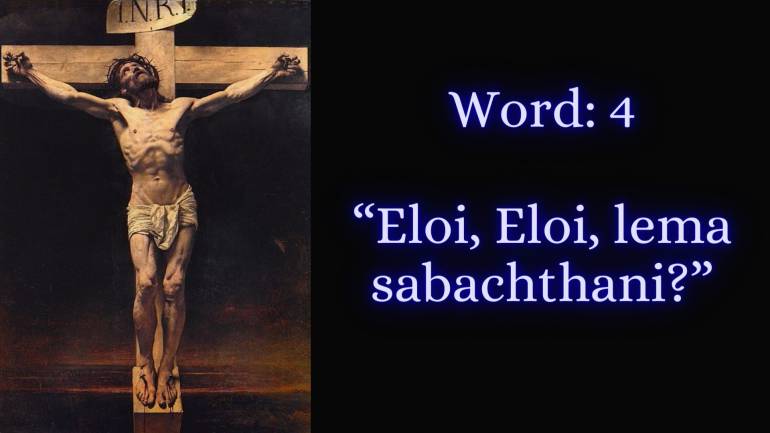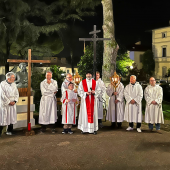The SEVEN LastWords of Jesus. Word:4 - “Eloi, Eloi, lema sabachthani?”

A. Text: Mark 15: 33–37
“And when the sixth hour had come, there was darkness over the whole land until the ninth hour. And at the ninth hour, Jesus cried with a loud voice, “Eloi, Eloi, lema sabachthani?” which means, “My God, my God, why hast thou forsaken me?” Some of the bystanders who heard it said, “Look, he is calling Elijah.” One of them ran, soaked a sponge with wine, put it on a reed, and gave it to him to drink, saying, “Wait, let us see if Elijah comes to take him down. And Jesus, having let go a loud cry, died.”
B. Exegesis
1. “sixth hour … ninth hour …”
In the biblical passage, we can trace Mark’s artistry. The Evangelist resorts to an organizing ‘pattern of three.’ Already it has been used so effectively in Jesus’ ‘three ’-fold prayer at Gethsemane and in Peter’s ‘three’ denials.
Here too Mark spells out a chronological pattern of a ‘three’-hour period:
i. the third hour - 9 am
ii. the sixth hour - noon
iii. the ninth hour - 3 pm
Between the third and sixth hours, ‘three’ groups mock and revile the Crucified Jesus:
i. passers-by
ii. chief priests and scribes
iii. criminals
The ‘mockery’ is related to the ‘mockery’ in Jesus’ trials, both Sanhedrin and Roman:
i. “Some began to spit on him. They blindfolded him and struck him and said to him, ‘Prophesy!’ And the guards greeted him with blows” (14,65) – mockery at Sanhedrin
ii. “The soldiers led him away inside the palace, that is, the praetorium, and assembled the whole cohort. They clothed him in purple and, weaving a crown of thorns, placed it on him. They began to salute him with, ‘Hail, King of the Jews!’ and kept striking his head with a reed and spitting upon him. They knelt before him in homage. And when they had mocked him, they stripped him of the purple cloak, dressed him in his clothes, and led him out to crucify him” (15,16-20)
2. “… darkness over the whole land!”
No human being shows Jesus sympathy in the first three-hour period: from the third to the sixth hour.
Now in the second three-hour period: from the sixth to the ninth hour, nature itself is plunged into a darkness that covers the whole land. Here echoes the warning of Amos 8,9 “On that day, says the Lord God, I will make the sun set at midday and cover the earth with darkness in broad daylight.” “On that day” = the Day of the Lord = a day of darkness, since Israel had sinned through injustice and idolatry against the light, granted by God.
3. “Jesus cried with a loud voice!”
Finally at the ninth hour, in response to three hours of mockery and three hours of nature’s gloom, Jesus breaks the silence with a loud voice.
Demons cried out as they encountered Jesus: “In their synagogue was a man with an unclean spirit; he cried out, ‘What have you to do with us, Jesus of Nazareth? Have you come to destroy us? I know who you are - the Holy One of God!’” (Mark 1,23-24). But now it is Jesus who cries out as He struggles with satan.
This cry of Jesus evokes the apocalyptic scene in Joel:
i. “Before them the earth trembles, the heavens shake; the sun and the moon are darkened, and the stars withhold their brightness. The LORD raises his voice at the head of his army; for immense indeed is his camp, yes, mighty, and it does his bidding. For great is the day of the LORD, and exceedingly terrible; who can bear it?” (2,10-11)
ii.. “The LORD roars from Zion, and Jerusalem raises his voice; the heavens and the earthquake, but the LORD is a refuge to his people, a stronghold to the men of Israel” (4,16)
4. “Eloi, Eloi, lema sabachthani?”
With a loud voice, Jesus makes His first, last and only statement, “Eloi, Eloi, lema sabachthani?” “Eloi, Eloi, lema sabachthani?” is an ‘Aramaic’ rendering of Psalm 22,2a. Jesus speaks, in a tone of intimacy, in His family language, Aramaic. (Psalm 22 is extensively used: offering of wine mixed with myrrh and the division of the garments as in Psalm 22,19).
In Matthew, it is ‘Hebrew’, “Eli, Eli lema sabachthani?” The invocation of God is changed to “Eli” probably because it can easily be related to the following verse about Jesus’ calling for Elijah, Eliyyahu in Hebrew (to mean ‘YHWH is my God’). In other words, this Hebraized form makes more intelligible the misunderstanding by the bystanders that Jesus is calling for Elijah.
“Eloi, Eloi”
Jesus speaks to Adonai as “God” instead of as ‘Father.’ It is an exaggeration to speak of Jesus’ despair, for He still speaks to “my God.” The “Abba” in the Garden is also His “my God”: “he said, “Abba, Father, all things are possible to you. Take this cup away from me, but not what I will but what you will” (14,36).
“lema sabachthani?”
On the cross, Jesus quotes a Psalm of lament, Psalm 22. In the Psalm, He quotes a verse of abandonment – a verse uttered by a suffering psalmist, who is made to suffer unjustly and terribly by his enemies who have surrounded him now, while his friends have abandoned him.
At this stage, the holy man drowned in spiritual and physical suffering, is puzzled, though he firmly believes in God, because up to now He has always supported and heard him, “Yet you drew me forth from the womb, made me safe at my mother’s breast. Upon you I was thrust from the womb; since birth you are my God” (22,10.11).
By citing a verse of abandonment, the Evangelist shows, without any hesitation, how Jesus, in utter agony, feels forsaken, as He faces a terrible death. Jesus, suffering and dying on the cross, takes up the prayer of the Psalmist. He is on the cross, not simply because of His foes, but because of His most intimate friends and disciples, who betrayed, denied and abandoned Him. He too is suffering terribly both physically and spiritually and hence, the cry to His dear Father.
So we can see the logic of Mark’s anguished prayer that this cup might pass from Him, “Abba, Father, all things are possible to you. Take this cup away from me, but not what I will but what you will” (14,36).
We are not far here from the Christology of Hebrews which portrays Jesus as experiencing the whole human condition like us in everything except sin, “For we do not have a high priest who is unable to sympathize with our weaknesses, but one who has similarly been tested in every way, yet without sin” (4,15).
5. “Look, he is calling Elijah”
Jesus hears these last human words, “Look, he is calling Elijah.” How does this prophet of yore come to the passion scene?
i. Here “Elijah” is a verbal link with “Eloi.”
ii. Malachi 3,23 foretells the return of Elijah, “Lo, I will send you Elijah, the prophet before the Day of the Lord comes, the great and terrible day”, who was taken heavenward in a fiery chariot, “As they walked on conversing, a flaming chariot and flaming horses came between them, and Elijah went up to heaven in a whirlwind” (2 Kings 2,11). Jewish tradition interpreted it literally and hence, the mockery of the bystanders, “Look, he is calling Elijah.”
What happens to Jesus’ plea? Is there an immediate response from the Father? The Father does not rescue His Son immediately. He lets Him drink the cup of suffering to the last drop. But He, in His own time, will fly to His patronage.
Instead of immediate divine help, Jesus’ plea leads thus to further sceptical mockery by some of the bystanders. They are sceptical or cynical about Elijah’s help. No Elijah comes to help Jesus. Elijah did come. John the Baptist came in the Elijah role not to deliver Jesus, but to die a martyr’s death and point to the type of violent death that awaits Jesus, “He told them, “Elijah will indeed come first and restore all things, yet how is it written regarding the Son of Man that he must suffer greatly and be treated with contempt? But I tell you that Elijah has come and they did to him whatever they pleased, as it is written of him” (Mark 9,12-13).
6. “a sponge with wine”
Jesus’ plea causes one of the bystanders to offer Him wine, in fulfilment of Psalm 69,22: “Instead they put gall in my food; for my thirst, they gave me vinegar.”
7. “And Jesus having let go a loud cry died”
This is how Mark captures the death of Jesus, “And Jesus, having let go a loud cry, died.” But Matthew alters it, “And Jesus, having again cried out in a loud voice, let go the spirit” (27,50). His alteration expresses both Jesus’ control over His destiny and His obedient giving up of His life to God.
C. Application
8. There are moments in our lives as well when we have to suffer all alone, abandoned by both friends and foes. In such moments, our faith in God is also put to a severe test. In our suffering, we may also cry out like Jesus.
Perhaps we may not receive an immediate response from God and find no end to or a way out of our suffering. But we can also be assured that in His own time and in His way, God the Father will, as it happened to Jesus, most certainly listen to our cry.
Are we the only ones who suffer? Perhaps the suffering of others could be more severe. What Helen Keller said could be true – “I cried because I had no shoes until I met a man who had no feet.”
9. Today, the bell tolls for the world with the outbreak of war and violence. The Christians living a life of pain and suffering and sinking in financial quicksand cry to God, “My God, my God, why hast thou forsaken me?”
The Father does not seem to work direct miracles to help them in this hour of death and dismay. The sky seems shut for Sabbaths and new moons without being torn apart for any divine voice to speak or for any divine intervention to take place.
Nevertheless, we Christians have been called upon to listen to the cry of the just sufferers at this hour and help them in the name of God. Listening to the cry of Jesus from the cross and our neighbour’s cry of pain is the same, for “Whoever receives one child such as this in my name, receives me; and whoever receives me, receives not me but the one who sent me” (Mark 9,37). Here “child”, a symbol, represents the anawim of the Christian community – the poor in spirit and the lowly. They are identified with Jesus.
In today’s context, these “children” could be the Christians, whose faith is shaken, benumbed, frozen, or on the verge of being lost. They could also be the daily wage earners who have fallen out of the frying pan into the fire. Shall we then listen to the cry of Jesus from the cross and feel for Him and not feel the same for our neighbors?
Radio Veritas Asia (RVA), a media platform of the Catholic Church, aims to share Christ. RVA started in 1969 as a continental Catholic radio station to serve Asian countries in their respective local language, thus earning the tag “the Voice of Asian Christianity.” Responding to the emerging context, RVA embraced media platforms to connect with the global Asian audience via its 21 language websites and various social media platforms.














